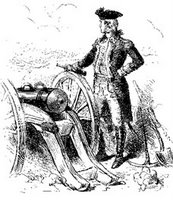Unfortunately, as a committee from the Massachusetts Provincial Congress reported on 23 June, “by a mistake in the name, the wrong officer was confined.” Putnam, a Connecticut general, didn’t know the artillery officers from the other colonies. Trevett was actually the only commander of a provincial artillery company to keep fighting to the end.
Trevett’s arrest caused some consternation, particularly among his Marblehead matrosses, who had stuck out the battle with him. Back in their home town, the mariner Ashley Bowen wrote in his diary for 19 June:
A grand muster with our Regiment. We cannot hear the particular at Charlestown. Some rain. Captain Sam Trevett under an arrest. For what?Within a couple of days the army brass had discovered the mistake. The congress’s committee reported on who really pulled back: “These Officers' names are, Captain [Samuel] Gridley and Captain John Kallander.” Callender was set up for court-martial instead.
But by then it was too late. Trevett and his men had gone home to Marblehead. On 29 June, the Massachusetts Committee of Safety tried to catch up to events through this resolution:
Mr. [Richard] Devens and Colonel [Azor] Orne, appointed to draw up a Vote relative to Captain Trevet and Company, reported the following, which was accepted, viz;Trevett declined the invitation and never rejoined the American army. Some of his men did, including his first sergeant and brother-in-law, Robert Wormsted. But Trevett had apparently had enough.
Whereas, from a mistake made by one of the General Officers, Capt. Samuel Russell Trevet has been put under arrest, which mistake is set forth in a Certificate by order of the General [Artemas Ward]; and upon examination it appears that said Trevet has approved himself a good officer, but said mistake has unhappily operated to the dispersion of his Company; therefore
Resolved, That said Captain Trevet be directed to collect his said Company as soon as possible, and then apply to this Committee in order to be commissioned.
What happened to Callender, Gridley, and Gridley’s relatives in the regiment after Gen. George Washington arrived will be part of my talk tonight at Anderson House, the national headquarters of the Society of the Cincinnati. Come on by if you’re in the neighborhood!

From what I have seen just today of the descendants' defense on the Internet of their much-maligned ancestors concerned in this tale, I'd say you have your work cut out for you tonight. I hope you come back in one piece! ;)
ReplyDeleteI met one nice descendant of Artemas Ward last night, but I must have been well out of Gridley/Callender/Trevett country since there were no complaints!
ReplyDeleteWhat commission do you suppose was offered to Trevett by the Mass. Prov. Congress? He was already commissioned into the Mass. service it seems. But this note in the Mass journals (June 28) seems to early to be a commission for the Continental Army. Any ideas?
ReplyDeleteAs I think more on this, presumably the commission was for the Massachusetts Army, suggesting Trevett was only a militia volunteer during the battle, or otherwise promised a commission by Col. Richard Gridley, who had not yet issued it.
ReplyDeleteTrevett had a regular Massachusetts commission in the artillery regiment before June 1775. I believe he resigned from the provincial army after the battle, angry at Maj. Gridley and at being arrested.
ReplyDeleteI suspect that the Massachusetts Provincial Congress offered Trevett a new commission in its army, most likely for an infantry company outside the Gridleys’ influence but possibly in an artillery company. At this time Col. John Glover was gathering his regiment and marching to the lines at Cambridge.
The Massachusetts legislature probably also knew that the Continental Congress had voted to adopt its army and was sending a new commander. However, Washington accepted the officer corps he found on the siege lines (with the exception of Col. Gridley’s Massachusetts promotion, which he maneuvered into the void). So a Massachusetts commission would have soon become a Continental commission through the end of the year.
Thanks for your insights!
ReplyDelete